
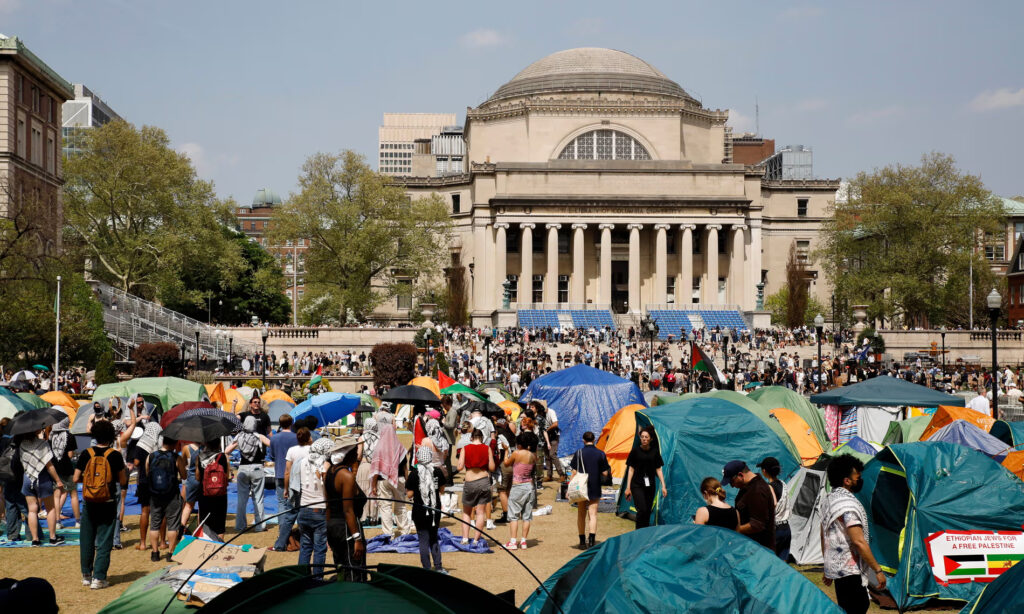
The Fall of Columbia
Columbia University has unraveled into a mere shell of its once distinguished self. In two years, an institution once looked upon as a beacon of intellect and higher education has transformed into a hive riddled with extremism, antisemitism and support for U.S.-designated terrorist organizations.
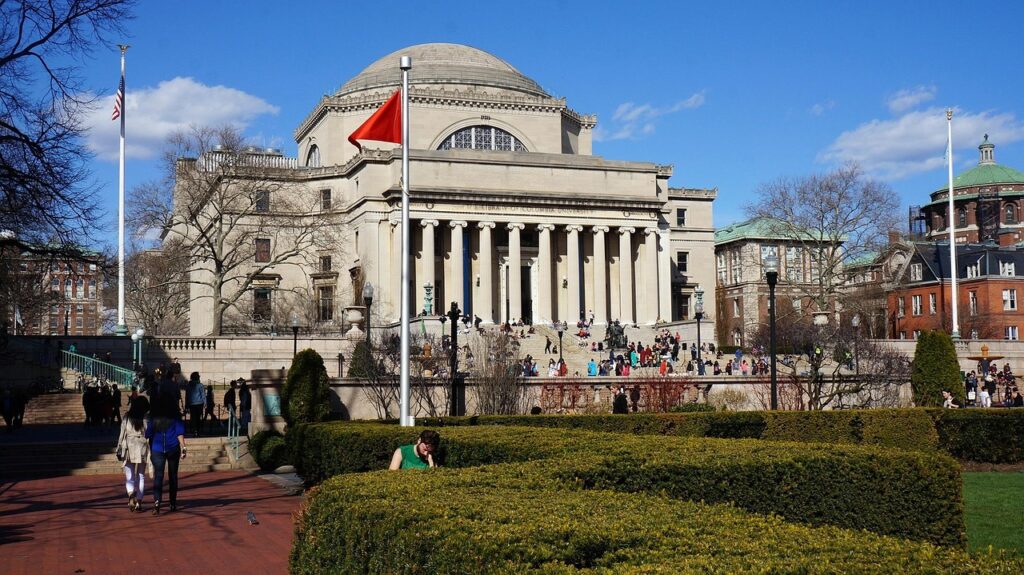
While students have become the face of the chaos seen on campus, the beating heart is pumped by Columbia’s faculty. They have created a destructive ripple effect that begins with the inaction of Columbia’s administrative leadership and passes through to the professors promoting extremist ideologies in the classroom and at the rallies. The end result has been a campus torn in half by division, hatred and fear.
The actions and intentions of these faculty members cannot be excused under the protection of academic freedom. Professional ethics have been breached on multiple levels.
The time for change is now
President Trump’s Executive Order
The continuing rise of antisemitism and terror support at Columbia University is by no means a passing trend. The dire seriousness of the issue was brought to public awareness on January 20, 2025, when President Donald Trump issued an executive order titled, “Protecting the United States from Foreign Terrorists and Other National Security and Public Safety Threats. “

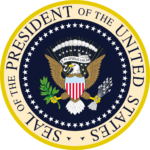 Trump’s new executive order has empowered and enabled the federal government to take action against extremists. In the case that an offending student or faculty member is green card or visa holder, they can be identified and deported for supporting U.S.-designated terrorist organizations or cause chaos on campus.
Trump’s new executive order has empowered and enabled the federal government to take action against extremists. In the case that an offending student or faculty member is green card or visa holder, they can be identified and deported for supporting U.S.-designated terrorist organizations or cause chaos on campus.
The Consequences of Columbia’s Failure to Act
Columbia’s complete inaction in the face of antisemitism, assaults and property damage, has come with hefty costs. In March 2025, following an investigation by the Federal Antisemitism Task Force, multiple Government agencies cancelled $430 million in grants and contracts to Columbia University.
Today, the prospect of reclaiming Columbia’s reputation as a trusted and respected academic institute lies solely in the hands of its leadership and the actions, they implement against the very individuals compromising its integrity.
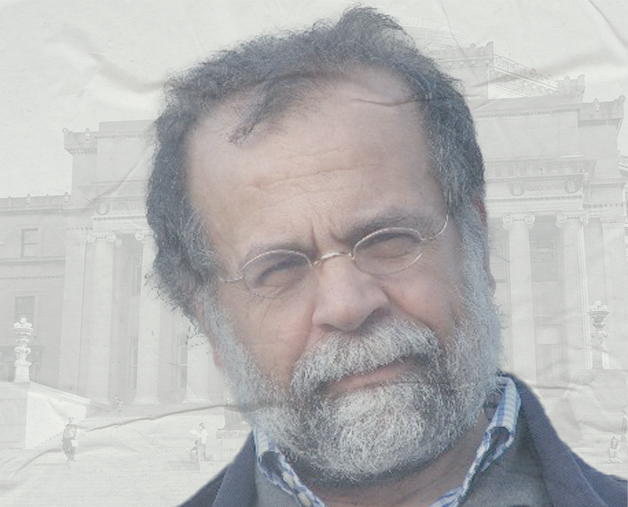
Hamid Dabashi
Hagop Kevorkian Professor of Iranian Studies and Comparative Literature
Endorsing Hamas and Extremist Activism
Dabashi has publicly supported Hamas-aligned activism, often praising violent uprisings against Israel. In April 2024, during Israel’s defensive war against Hamas, Dabashi joined Columbia’s pro-Hamas encampment and participated in the faculty walkout supporting students who were arrested for criminal actions on campus. Despite the encampment’s violent rhetoric and antisemitic slogans, Dabashi stood in solidarity with protestors demanding Columbia “Disclose, Divest” and end disciplinary action against those involved in hate-fueled disruptions. His past rhetoric makes this alignment unsurprising. In reference to the 2018 Gaza border riots, which were orchestrated by Hamas and resulted in deaths and injuries, Dabashi described the events as a “bold act of nonviolent revolutionary mobilization,” claiming they “schooled Gandhi” and “sent Martin Luther King back to school.”Promotion of Antisemitic Conspiracy Theories
Dabashi’s academic and public commentary are steeped in antisemitic tropes and conspiracies. Over the years, he has claimed:- That “Zionist cabals” and “Zionist bosses” control U.S. politics
- That American Jews operate as a “Fifth Column of a foreign country”
- That “rich and powerful Zionists” have “infiltrated all the corridors of power”
Comparing Israel to ISIS and Nazi Germany
Dabashi has equated the State of Israel with some of the most violent regimes in history. In various writings and posts, he has described Israel as:- “The most well-funded terrorist organization on planet Earth”
- Morally equivalent to ISIS: “What’s the difference between ISIS and ISRAEL?”
- A Nazi-like regime: likening Gaza to Auschwitz, and Zionist militarism to Nazi barbarism
Demonization of Jews
Dabashi has repeatedly demonized Israelis and Jews as a people and Jewish identity as inherently corrupt:- Referred to Israeli citizens as “delusional fanatics”
- Described the Israeli flag and name as “synonymous with mass murderers”
- Claimed that Israeli culture suffers from a “bone-deep vulgarity of character”
Institutional Ties to Antisemitic Movements
Dabashi has formal affiliations with extremist groups that operate under the guise of activism:- He serves on the advisory board of USACBI, the U.S. arm of the Palestinian BDS National Committee, which advocates for academic boycotts of Israel and delegitimizes its right to exist.
- He has supported Students for Justice in Palestine (SJP) and Jewish Voice for Peace (JVP), both of which have been condemned nationally for antisemitic actions on campus.
- He helped launch Columbia University Apartheid Divest (CUAD), a coalition that targets Israel’s existence through economic and cultural warfare.
Implications for Columbia University
As a tenured professor, Hamid Dabashi wields enormous influence over the academic culture and intellectual framing of Middle East politics at Columbia. His glorification of violence, propagation of antisemitic narratives, and collaboration with terror-aligned groups directly undermines the university’s mission of intellectual rigor, diversity, and safety. Jewish students cannot feel safe in an environment where a professor promotes the ideology of their would-be murderers. And no university should tolerate faculty who use their scholarship to legitimize hate and terrorism. Hamid Dabashi represents the worst of what happens when academia is weaponized to spread hate. His long record of antisemitic statements, his support for Hamas-linked activism, and his demonization of Jews disqualify him from any role in higher education—let alone at one of the world’s leading universities. Columbia must decide whether it will continue to shelter those who glorify terror and incite division—or take action to uphold the values it claims to represent. Hagop Kevorkian Professor of Iranian Studies and Comparative Literature [{"url":"https:\/\/columbia-papers.com\/wp-content\/uploads\/2025\/04\/tweet-1.png","alt":"Image 1"},{"url":"https:\/\/columbia-papers.com\/wp-content\/uploads\/2025\/04\/tweets-2-2.png","alt":"Image 2"},{"url":"https:\/\/columbia-papers.com\/wp-content\/uploads\/2025\/04\/tweets-3-2.png","alt":"Image 3"},{"url":"https:\/\/columbia-papers.com\/wp-content\/uploads\/2025\/04\/tweets-4-2.png","alt":"Image 4"},{"url":"https:\/\/columbia-papers.com\/wp-content\/uploads\/2025\/04\/tweets-5-2.png","alt":"Image 5"},{"url":"https:\/\/columbia-papers.com\/wp-content\/uploads\/2025\/04\/tweets-6-2.png","alt":"Image 6"}] https://columbia-papers.com/wp-content/uploads/2025/04/HMID-DABASHI-PIC.png []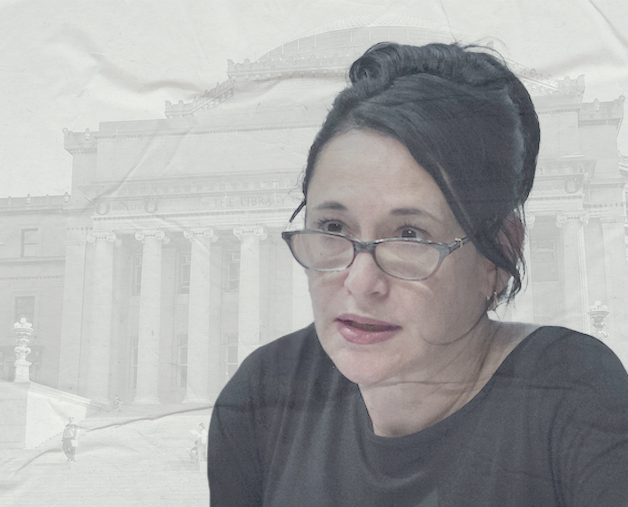
Nadia Abu-El-Haj
Ann Whitney Olin Professor in the Departments of Anthropology and Co-Director of the Center for Palestine Studies
Distorting History to Erase Jewish Identity
Abu-El-Haj’s efforts to undermine the legitimacy of the Jewish people’s historical connection to Israel began with her 2002 book, Facts on the Ground: Archaeological Practice and Territorial Self-Fashioning in Israeli Society. The book accused Israeli archaeologists of fabricating evidence to support Jewish historical claims in the region—an allegation widely condemned as academically dishonest and ideologically motivated. Despite serious criticism, she was controversially awarded tenure in 2007, sparking backlash from academic peers who cited antisemitism, poor scholarship, and politicized research methods. Her academic record reflects a deliberate attempt to rewrite history for ideological purposes.Leading Antisemitic Movements in Academia
Abu-El-Haj has not confined her activism to books. In 2015, she led a campaign at the American Anthropological Association to impose an academic boycott on Israeli institutions—a direct attack on Jewish academic participation under the guise of “solidarity.” While the campaign failed, it confirmed her long-standing role as a central figure in the Boycott, Divestment, and Sanctions (BDS) movement, which seeks to delegitimize Israel’s existence.Supporting Terrorism and Justifying Hamas Atrocities
On October 30, 2023, less than a month after Hamas’s October 7 massacre of over 1,200 Israeli civilians, Abu-El-Haj signed an open letter defending Columbia students who attempted to justify the attacks. The letter described the atrocities as “resistance” and a “military response”—language that mirrors Hamas propaganda. Her signature on this statement is not a scholarly stance—it is an endorsement of mass murder, hostage-taking, and the glorification of terror.Faculty Leadership in Columbia’s Pro-Hamas Encampment
Abu-El-Haj was an active participant in Columbia’s pro-Hamas “Gaza Solidarity Encampment,” launched on April 17, 2024. The encampment, organized by Columbia University Apartheid Divest (CUAD), was marked by antisemitic slogans, physical harassment of Jewish students, and the illegal occupation of campus grounds. She appeared:- April 19, 2024: In an Instagram photo at the encampment.
- April 22, 2024: In a Freedom News TV video, wearing a yellow-striped vest as part of a faculty guard.
- May 1, 2024: In an Instagram video, publicly addressing students and condemning NYPD officers for intervening after the violent takeover of Hamilton Hall.
Inciting Hostility Toward Law Enforcement
Rather than calling for accountability, Abu-El-Haj condemned the NYPD’s intervention at Columbia and called for an end to the suspension of students involved in the criminal occupation of Hamilton Hall. Her statements promoted the idea that the rioters were victims rather than perpetrators, further inflaming tensions on campus. In March 2024, she also appeared at a press conference defending Mahmoud Khalil, a Columbia graduate student arrested by ICE with direct ties to Hamas—a student Abu-El-Haj supported publicly despite clear national security implications. She has even equated Israel’s targeting of Hezbollah leader Hassan Nasrallah to the 9/11 terror attacks, showing her willingness to distort international terrorism through the lens of anti-Israel propaganda.Conclusion: A Radical Disguised as a Scholar
Nadia Abu-El-Haj has used her position at Columbia not to educate but to radicalize. Her body of work dismisses historical truth in favor of ideological agendas. Her activism defends terror under the guise of resistance. And her presence at Columbia University has emboldened movements that endanger Jewish students, glorify violence, and erode academic credibility. Columbia must decide whether it will continue to elevate faculty members who distort history, justify terrorism, and fan the flames of antisemitic extremism. Nadia Abu-El-Haj does not belong in the classroom—she belongs in the category of those who abuse scholarship to advance hate. Ann Whitney Olin Professor in the Departments of Anthropology and Co-Director of the Center for Palestine Studies [{"url":"https:\/\/columbia-papers.com\/wp-content\/uploads\/2025\/04\/na-tweets-1.png","alt":"Image 1"},{"url":"https:\/\/columbia-papers.com\/wp-content\/uploads\/2025\/04\/na-tweets-7-1.png","alt":"Image 2"},{"url":"https:\/\/columbia-papers.com\/wp-content\/uploads\/2025\/04\/na-tweets-6-1.png","alt":"Image 3"},{"url":"https:\/\/columbia-papers.com\/wp-content\/uploads\/2025\/04\/na-tweets-5-1.png","alt":"Image 4"},{"url":"https:\/\/columbia-papers.com\/wp-content\/uploads\/2025\/04\/na-tweets-4-1.png","alt":"Image 5"},{"url":"https:\/\/columbia-papers.com\/wp-content\/uploads\/2025\/04\/na-tweets-3-1.png","alt":"Image 6"},{"url":"https:\/\/columbia-papers.com\/wp-content\/uploads\/2025\/04\/na-tweets-2-1.png","alt":"Image 7"},{"url":"https:\/\/columbia-papers.com\/wp-content\/uploads\/2025\/04\/tweets-8.png","alt":"Image 8"},{"url":"https:\/\/columbia-papers.com\/wp-content\/uploads\/2025\/04\/tweets-9.png","alt":"Image 9"}] https://columbia-papers.com/wp-content/uploads/2025/04/NADIA-ABU-ELHAJ-pic.png []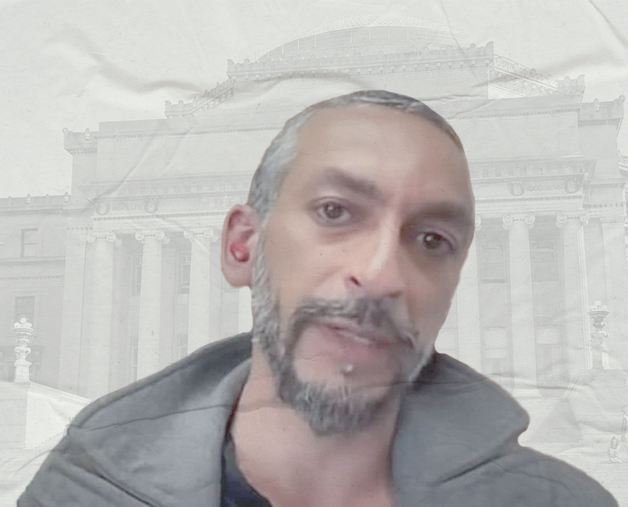
Mohamed Abdou
Visiting professor in modern Arab studies at Columbia’s Middle East Institute (MEI)
His Role on Campus
From the earliest days of the October 7 attacks, Abdou embedded himself into the heart of campus unrest. A vocal affiliate of Students for Justice in Palestine (SJP), he not only participated in—but helped lead—illegal, hate-filled encampments and rallies, where calls for Jewish ethnic cleansing and praise for terrorism were rampant. He has used both his lectures and public appearances to inject pro-Hamas propaganda into the academic environment. On May 7, 2024, Abdou appeared in a video posted to X, proudly declaring: “I’ve taught…the last two weeks at the encampment…I actually was the first professor to do that.” This encampment, overrun with antisemitic pamphlets and Hamas glorification, became a staging ground for radicalism on Columbia’s campus—with Abdou playing the role of ideological instructor.Open Allegiance to Hamas
Abdou has not hidden his support for Hamas. He has stated it clearly and repeatedly across multiple platforms. On January 6, 2024, during an interview on Revolutionary Left Radio, he stated plainly: “I might be with Hamas and support the resistance, absolutely.” In a November 30, 2023 interview on the YouTube show Aunty K’s Tarot, Abdou praised Hamas’ fighters: “You don’t need mass movements to change the world. You need a few thousand that are really organized.” He went on to describe the October 7 terrorists as revolutionary heroes: “The resistance fighters within Hamas, who numbered fewer than 1,500, managed to turn the tables not just on a settler-colonial state with no clear borders, but on the entire world.” Just nine days after the October 7 massacre, on October 16, Abdou posted a prayer to social media: “Victory over the oppressors,” — a clear reference to Hamas’ actions.Glorification of Individual Terrorists
Abdou’s admiration for terrorism goes far beyond Hamas. He has celebrated individual attackers with long histories of violence. On November 3, 2023, he posted a tribute to Fatima Bernawi, a Palestinian militant who attempted to bomb a crowded movie theater in Jerusalem in 1967. Abdou praised her as a “Black Palestinian revolutionary,” omitting entirely her role in a foiled terror attack targeting civilians.Hostility Toward America
Incredibly, while employed by one of America’s top universities and teaching its students, Abdou has repeatedly denounced the country and its values. On February 15, 2024, during an event titled “Propaganda and Genocide: Israel’s War on Truth”, Abdou stated: “I don’t pledge allegiance to no American flag. I don’t call myself an American… It’s a white supremacist order.” He further rejected the legitimacy of American civic society: “It ain’t your city! This is indigenous land!... If I was a Jew in Palestine, I would say ‘This is not my land! Either I leave or I stand and fight with the Palestinian people!’” Abdou concluded his remarks by openly defending political violence: “The onset of decolonization is inherently a violent act. There is no undoing the violence.” This rhetoric wasn’t theoretical—he was actively encouraging students to engage in violent struggle, claiming: “I have the power then to go organize with indigenous people and to center them in my life.”Conclusion
Rather than fostering critical thought, Abdou has used his position to promote one-sided propaganda, glorify terrorism, and indoctrinate students into extremist worldviews. His lectures have become platforms for militant messaging—not education. Students under his influence are not challenged to think critically or explore complex issues, but rather are fed a steady diet of radicalism, anti-Americanism, and justification for terror.
His participation in illegal encampments, use of public platforms to promote Hamas, and repeated glorification of political violence directly violate Columbia University’s academic standards and code of conduct. Abdou is not just controversial—he is a clear and present danger to students, the academic environment, and campus safety. Visiting professor in modern Arab studies at Columbia’s Middle East Institute (MEI) [{"url":"https:\/\/columbia-papers.com\/wp-content\/uploads\/2025\/04\/ma-tweets-11-1.png","alt":"Image 1"},{"url":"https:\/\/columbia-papers.com\/wp-content\/uploads\/2025\/04\/ma-tweets-10-1.png","alt":"Image 2"},{"url":"https:\/\/columbia-papers.com\/wp-content\/uploads\/2025\/04\/ma-tweets-9-1.png","alt":"Image 3"},{"url":"https:\/\/columbia-papers.com\/wp-content\/uploads\/2025\/04\/ma-tweets-8-1.png","alt":"Image 4"},{"url":"https:\/\/columbia-papers.com\/wp-content\/uploads\/2025\/04\/ma-tweets-7-1.png","alt":"Image 5"},{"url":"https:\/\/columbia-papers.com\/wp-content\/uploads\/2025\/04\/ma-tweets-6-1.png","alt":"Image 6"},{"url":"https:\/\/columbia-papers.com\/wp-content\/uploads\/2025\/04\/ma-tweets-5-1.png","alt":"Image 7"},{"url":"https:\/\/columbia-papers.com\/wp-content\/uploads\/2025\/04\/ma-tweets-4-1.png","alt":"Image 8"},{"url":"https:\/\/columbia-papers.com\/wp-content\/uploads\/2025\/04\/ma-tweets-3-1.png","alt":"Image 9"},{"url":"https:\/\/columbia-papers.com\/wp-content\/uploads\/2025\/04\/ma-tweets-2-1.png","alt":"Image 10"},{"url":"https:\/\/columbia-papers.com\/wp-content\/uploads\/2025\/04\/ma-tweets-1-1.png","alt":"Image 11"},{"url":"https:\/\/columbia-papers.com\/wp-content\/uploads\/2025\/04\/tweets-15.png","alt":"Mohamed Abdou"},{"url":"https:\/\/columbia-papers.com\/wp-content\/uploads\/2025\/04\/tweets-12.png","alt":"Mohamed Abdou"},{"url":"https:\/\/columbia-papers.com\/wp-content\/uploads\/2025\/04\/tweets-14.png","alt":"Mohamed Abdou"},{"url":"https:\/\/columbia-papers.com\/wp-content\/uploads\/2025\/04\/tweets-13.png","alt":"Mohamed Abdou"}] https://columbia-papers.com/wp-content/uploads/2025/04/MOHAMED-ABDOU-pic.png []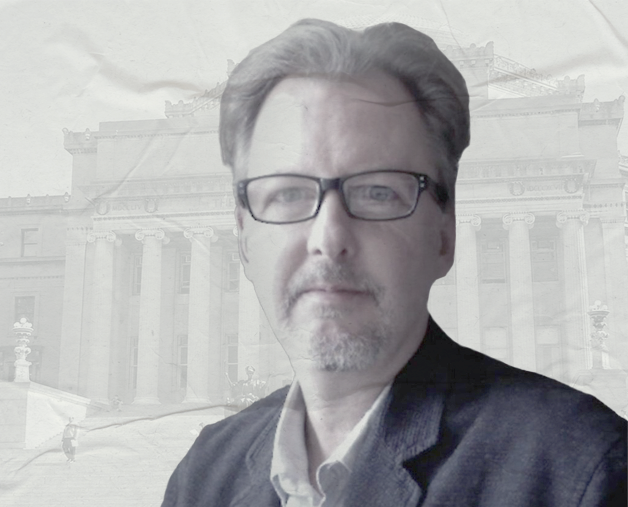
Joseph Slaughter
Associate Professor of English and Comparative Literature and Executive Director of the Institute for the Study of Human Rights
Defending the Justification of Terrorism
Just weeks after Hamas terrorists murdered over 1,200 civilians on October 7, 2023—including women, children, and the elderly—Slaughter signed an open letter on October 30, 2023, defending Columbia students who had attempted to justify the massacre as “resistance.” The letter ignored the mass rape, kidnappings, and beheadings committed during the attacks and instead framed Hamas’s actions as part of a broader anti-colonial struggle. By publicly aligning with a statement that legitimized terror, Slaughter signaled his willingness to excuse mass violence when it aligns with his ideological commitments—regardless of the human cost.Faculty Marshal of Columbia’s Pro-Hamas Encampment
In April 2024, Slaughter served as a “faculty marshal” at the Columbia University Apartheid Divest (CUAD) encampment, where Jewish students were harassed, barred from campus facilities, and subjected to hate speech. He was seen on:- April 22, 2024: Participating in the “Faculty Walkout” rally supporting students arrested for trespassing, vandalism, and incitement.
- April 29, 2024: Photographed interacting with encampment protestors outside Butler Library.
- May 1, 2024: Seen wearing a neon vest and holding a sign that read “No War on Students,” just hours after violent agitators were arrested for the armed occupation of Hamilton Hall.
- Mat 15, 2024: Professor Joseph gave a graduation speech on a message saying that he stands in solidarity with various groups, yet he ignored campus antisemitism, excluded Zionists, and reinforced the administration’s indifference toward Jewish students' safety and inclusion.
Blocking Jewish Students From Campus
In April 2024, while serving both as a university official and faculty marshal, Slaughter was allegedly involved in physically blocking Jewish students from entering parts of campus occupied by encampment activists. A formal complaint was later filed under Title VI of the Civil Rights Act, accusing Slaughter of participating in discriminatory acts that created a hostile environment for Jewish students. If true, these actions represent a severe abuse of authority—weaponizing protest privilege to discriminate on the basis of religion and national origin.Deep Ties to Extremism
Slaughter is closely affiliated with Columbia’s Center for Palestine Studies, a hub for radicalized faculty who routinely glorify terrorism, promote BDS, and whitewash the crimes of Hamas and Hezbollah. His public support for the Boycott, Divestment, and Sanctions (BDS) movement places him squarely within a global campaign that seeks the isolation of Israel while ignoring the actions of recognized terrorist organizations. Though his official title is Executive Director of the Institute for the Study of Human Rights, Slaughter’s record reflects a disturbing pattern of siding with movements that threaten human rights—particularly those of Jews, Israelis, and political dissidents who challenge pro-Hamas orthodoxy. Joseph Slaughter has repeatedly abandoned the principles he is supposed to uphold. As a professor, administrator, and protest marshal, he has enabled antisemitism, supported groups aligned with terrorism, and contributed to an environment where Jewish students are unsafe and unwelcome. His record is not one of advocacy for justice, but of betrayal—betrayal of academic neutrality, university policy, and the core values of human rights. Columbia must reckon with the fact that one of its most influential faculty members has chosen extremism over education, and radicalism over responsibility. Associate Professor of English and Comparative Literature and Executive Director of the Institute for the Study of Human Rights [{"url":"https:\/\/columbia-papers.com\/wp-content\/uploads\/2025\/04\/js-tweet-1.png","alt":"Image 1"}] https://columbia-papers.com/wp-content/uploads/2025/04/JOSEPH-SLAUGHTER-PIC.png ["https:\/\/columbia-papers.com\/wp-content\/uploads\/2025\/04\/js-1video.mp4","https:\/\/columbia-papers.com\/wp-content\/uploads\/2025\/04\/js-2video-2.mp4"]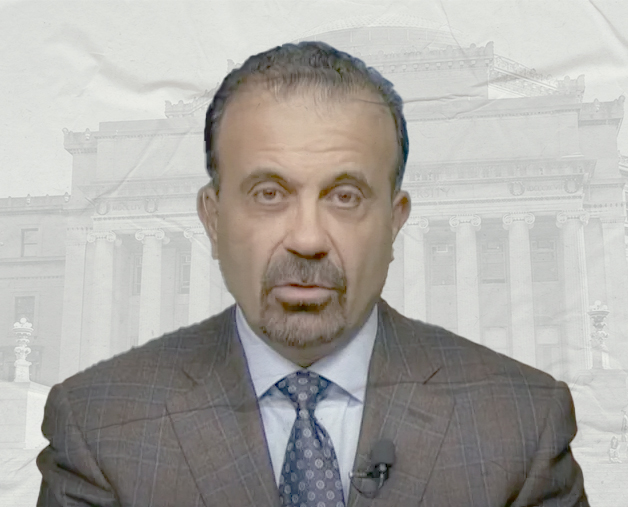
Joseph Massad
Professor of Modern Arab Politics and Intellectual History
His Role at Columbia University
As a long-time fixture at Columbia's Middle East Institute, Massad has leveraged his authority and tenure to shape an academic environment that promotes extremist narratives under the cover of scholarship. His lectures routinely cross the line from political critique into outright indoctrination—using his course materials, talks, and public appearances to normalize violent resistance and delegitimize Israel’s existence. Massad is not a fringe figure. He is deeply embedded in Columbia’s academic structure and participates actively in the university’s pro-Palestinian events, rallies, and panel discussions. Far from offering balanced analysis, his commentary inflames tensions and promotes a one-sided worldview that validates terrorism as a legitimate form of resistance. The result is a hostile environment for students—particularly Jewish students—who are forced to navigate classrooms where terrorism is defended and Jews were demonized.Pro-Hamas Stance and Support for Terrorism
Massad’s allegiance to Hamas is unambiguous. He has repeatedly rejected Hamas’ designation as a terrorist organization, instead portraying the group as a heroic resistance movement. In doing so, he has dismissed the horrific acts of terrorism perpetrated by Hamas—including mass murder, rape, and kidnapping—as legitimate political action.- November 2023 – On a radical leftist podcast, Massad claimed:
- October 2023 – Just days after the October 7 massacre, Massad posted:
- January 2024 – In an interview, Massad declared:
Glorification of Terrorists
Massad’s radicalism extends to the individuals behind acts of mass violence. He has publicly praised known terrorists and figures responsible for some of the most brutal attacks in the Israeli-Palestinian conflict.- December 2023 – Massad honored Abu Jihad, the orchestrator of the 1978 Coastal Road Massacre, in which 37 civilians—including 12 children—were murdered. He called him a “hero of the Palestinian revolution.”
- October 2023 – He published an article praising Hezbollah, another U.S.-designated terrorist group, describing its actions as “an essential part of the resistance against imperialism and Zionism.”
Antisemitism and Holocaust Revisionism
Massad has built much of his academic reputation on the revision and distortion of Jewish history. His writings and lectures frequently advance antisemitic tropes, including the denial of Jewish identity, the erasure of Jewish suffering, and the accusation that Jews themselves are responsible for antisemitism.- In his 2013 article The Last of the Semites, Massad accused Zionists of collaborating with Nazis and suggested that Israel’s founding was based on exploiting Holocaust trauma. He described Zionism as a continuation of “Nazi policies”—a grotesque and deeply offensive comparison.
- He has denied the Jewish connection to Israel, claiming Jews are merely “European converts,” and has called Zionism a “Christian colonial enterprise.”
- He has even gone so far as to argue that Palestinians are the real Semites, a claim that erases Jewish identity and rewrites history to serve a political narrative.
Denial of Jewish History
Massad’s worldview hinges on the false premise that Israel has no historical legitimacy. He routinely denies the long-standing Jewish connection to the land of Israel and dismisses Jewish indigeneity as colonial myth.- January 2024 – In a Columbia lecture, he stated:
- February 2024 – At a university panel:
Professional Controversies and Campus Impact
Massad's controversial behavior is not new. He has been the subject of major investigations and complaints throughout his academic career.- 2004 Columbia Investigation – Massad was investigated for allegedly intimidating Jewish students in his classroom and silencing dissent. Students reported verbal abuse and open hostility toward pro-Israel perspectives.
- Second Intifada Rally – Massad once cancelled class to lead an anti-Israel rally, where he referred to Israel as a “racist state” and called for its dismantlement.
- He has regularly used extremist platforms like Electronic Intifada to push inflammatory rhetoric that vilifies Jewish identity, history, and the State of Israel.
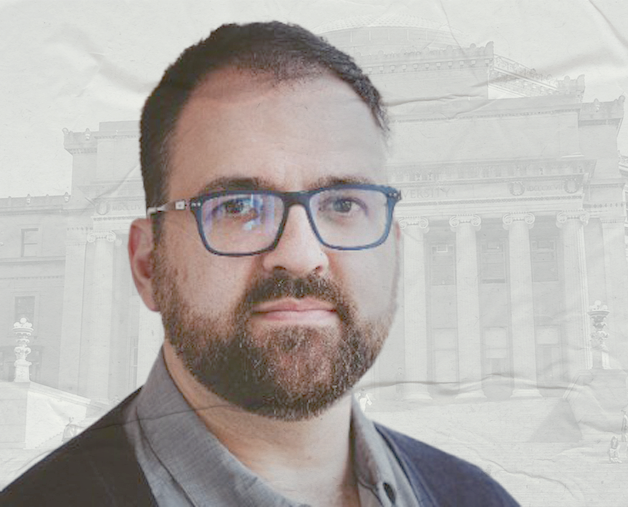
Joseph Howley
Associate Professor in the Department of Classics
Justifying the Hamas Massacres of October 7
Howley’s most egregious act was signing a public letter on October 30, 2023, that sought to reframe Hamas’s October 7 massacre—where over 1,200 innocent Jews were brutally murdered, raped, and kidnapped—as a “military response” and an expression of “resistance.” The letter, endorsed by several Columbia and Barnard faculty, referred to the attack as “one salvo in an ongoing war” and dismissed it as the natural outcome of “violent and illegal occupation.” By using academic language to sanitize terrorism and elevate Hamas’s atrocities as resistance, Howley contributed to a growing intellectual movement that dehumanizes Israeli and Jewish civilians and glorifies terror as legitimate political action. His endorsement of this narrative represents a moral collapse unworthy of any institution committed to truth and human rights.Normalizing Terror Support Through Public Writings
In November 2023, Howley published an op-ed in the Columbia Spectator calling the university’s suspension of SJP and JVP “unjust” and an “infringement on free speech.” He dismissed accusations that these groups used threatening rhetoric, claiming the university acted under donor and political pressure. Howley argued that supporting Palestinian “resistance” should not be equated with antisemitism, and even invoked his Jewish identity to defend these groups and his positions. In 2024, he published a broader essay titled "A Year Under the Palestine Exception at Columbia University," accusing Columbia of suppressing pro-Palestinian voices, caving to political influence, and abandoning its academic values. He blamed the administration for intensifying tensions on campus and claimed that disciplinary measures following October 7 had led to “violent clashes between students and police.”Key Dates of Joseph Howley’s Extremist Activity
Justification of Hamas Terrorism
- October 30, 2023 Signed faculty letter reframing the October 7 Hamas massacre as a “military response” and an act of “resistance.”
Public Rallies & Speeches
- November 15, 2023 Spoke at Columbia protest defending SJP and JVP after their praise for Hamas.
- February 8, 2024 Featured speaker at “Walkout, Art Build, and Student-Led March for Gaza,” organized by Columbia University Apartheid Divest (CUAD).
- May 6, 2025 Attended a silent vigil holding signs of pro-Hamas students detained by ICE: Mahmoud Khalil, Rumeysa Ozturk, and Badar Khan Suri.
- May 18–19, 2025 Stood beside Mohsen Mahdawi at Columbia’s graduation holding Khalil’s photo, and later attended a radical “People’s University for Palestine” ceremony honoring Khalil.
Pro-Hamas Encampment Involvement
- April 22, 2024 Appeared in a Freedom News TV video at Columbia’s Gaza encampment wearing a faculty vest.
- April 26, 2024 Posted photo with Rep. Jamaal Bowman at the encampment.
- April 30, 2024 Even after activists stormed Hamilton Hall and held workers hostage, Howley continued supporting the encampment.
- May 1, 2024 Posted a video defending the encampment, just a day after the Hamilton Hall seizure.
- May 7, 2025 Supported and attempted to access Butler Library after it was illegally occupied by protesters.
- May 27, 2025 Participated in a vigil at Columbia honoring detained pro-Hamas students, including Mahmoud Khalil.
Defending Terror-Linked Students and Attacking ICE
Howley’s social media activity has grown increasingly inflammatory. He repeatedly defended students arrested by ICE for supporting Hamas, referring to their detentions as “kidnappings” and equating their images with those of Israeli hostages. He posted a propaganda-style image of Rumeysa Ozturk on April 18, mimicking hostage posters used for Israeli victims of Hamas.- March 11, 2025 Shared protest footage from an anti-ICE rally.
- March 13, 2025 Posted support for Mahmoud Khalil, denounced Sen. Marco Rubio and Sen. Chuck Schumer, and referred to Donald Trump as a “Neo-Nazi” and “white supremacist.”
- April 2, 2025 Backed students who chained themselves to campus gates protesting Khalil’s detention.
- April 16, 2025 Shared a Columbia Philosophy Department statement supporting Mohsen Mahdawi, another ICE detainee who openly promotes Hamas and antisemitism.
- April 19, 2025 Amplified quotes condemning student arrests and calling for protection of pro-Hamas activists.
- May 26, 2025 Posted a series of stories listing alleged “Zionist murders” of pro-Palestinians—immediately following the murder of two Israeli diplomats in Washington, DC—appearing to justify the killings.
Whitewashing Antisemitism and Inciting Division
In an interview at the encampment, Howley claimed that accusations of antisemitism are being weaponized to stifle speech. He insisted that the protests are rooted in social justice, not hatred—despite the fact that many were accompanied by antisemitic chants and threats. He accused Columbia of capitulating to Zionist influence and lamented a growing alliance between right-wing and pro-Israel voices, claiming they were silencing dissent. Howley has also been directly accused of misrepresenting his role in these protests. On March 18, 2025, a public letter surfaced accusing him of dishonestly downplaying his influence in antisemitic demonstrations.A Dangerous Presence in the Classroom
As an educator, Joseph Howley holds influence over Columbia students at a time when campus tensions are at a breaking point. His public endorsements of terror, defense of groups involved in violence, and propagation of anti-Israel conspiracy theories create a hostile learning environment – particularly for Jewish students. Rather than fostering critical inquiry, Howley presents a one-sided ideological narrative that whitewashes atrocities and promotes deeply divisive political movements. Students are not being challenged to think independently; they are being immersed in a worldview that rationalizes violence and demonizes democratic allies.Conclusion
Joseph Howley is not merely a protestor or activist—he is a central figure in the intellectual and physical infrastructure that has allowed extremism to fester at Columbia. From authoring essays that justify Hamas to showing up in person at illegal occupations and vigils for terror-linked students, he consistently uses his academic position to advance pro-terror, anti-Israel, and antisemitic causes. By continuing to employ Howley, Columbia signals to its students, donors, and the public that it will tolerate—and even protect—faculty who glorify terrorism and radicalize the next generation. Howley’s actions have endangered students, undermined university policies, and lent the university’s credibility to movements that openly call for the destruction of Israel and the silencing of Jewish voices. Associate Professor in the Department of Classics [{"url":"https:\/\/columbia-papers.com\/wp-content\/uploads\/2025\/04\/Tweets-1.png","alt":"Image 1"},{"url":"https:\/\/columbia-papers.com\/wp-content\/uploads\/2025\/04\/Tweets-17-1.png","alt":"Image 2"},{"url":"https:\/\/columbia-papers.com\/wp-content\/uploads\/2025\/04\/Tweets-16-1.png","alt":"Image 3"},{"url":"https:\/\/columbia-papers.com\/wp-content\/uploads\/2025\/04\/Tweets-15-1.png","alt":"Image 4"},{"url":"https:\/\/columbia-papers.com\/wp-content\/uploads\/2025\/04\/Tweets-14-1.png","alt":"Image 5"},{"url":"https:\/\/columbia-papers.com\/wp-content\/uploads\/2025\/04\/Tweets-13-1.png","alt":"Image 6"},{"url":"https:\/\/columbia-papers.com\/wp-content\/uploads\/2025\/04\/Tweets-12-1.png","alt":"Image 7"},{"url":"https:\/\/columbia-papers.com\/wp-content\/uploads\/2025\/04\/Tweets-11-1.png","alt":"Image 8"},{"url":"https:\/\/columbia-papers.com\/wp-content\/uploads\/2025\/04\/Tweets-10-1.png","alt":"Image 9"},{"url":"https:\/\/columbia-papers.com\/wp-content\/uploads\/2025\/04\/Tweets-9-1.png","alt":"Image 10"},{"url":"https:\/\/columbia-papers.com\/wp-content\/uploads\/2025\/04\/Tweets-8-1.png","alt":"Image 11"},{"url":"https:\/\/columbia-papers.com\/wp-content\/uploads\/2025\/04\/Tweets-7-1.png","alt":"Image 12"},{"url":"https:\/\/columbia-papers.com\/wp-content\/uploads\/2025\/04\/Tweets-6-3.png","alt":"Image 13"},{"url":"https:\/\/columbia-papers.com\/wp-content\/uploads\/2025\/04\/Tweets-5-3.png","alt":"Image 14"},{"url":"https:\/\/columbia-papers.com\/wp-content\/uploads\/2025\/04\/Tweets-4-3.png","alt":"Image 15"},{"url":"https:\/\/columbia-papers.com\/wp-content\/uploads\/2025\/04\/Tweets-3-3.png","alt":"Image 16"},{"url":"https:\/\/columbia-papers.com\/wp-content\/uploads\/2025\/04\/Tweets-21.png","alt":"Image 17"},{"url":"https:\/\/columbia-papers.com\/wp-content\/uploads\/2025\/04\/Tweets-18.png","alt":"Image 18"},{"url":"https:\/\/columbia-papers.com\/wp-content\/uploads\/2025\/04\/Tweets-25.png","alt":"Image 19"},{"url":"https:\/\/columbia-papers.com\/wp-content\/uploads\/2025\/04\/Tweets-29.png","alt":"Image 20"}] https://columbia-papers.com/wp-content/uploads/2025/04/Joseph-Howley-PIC.png []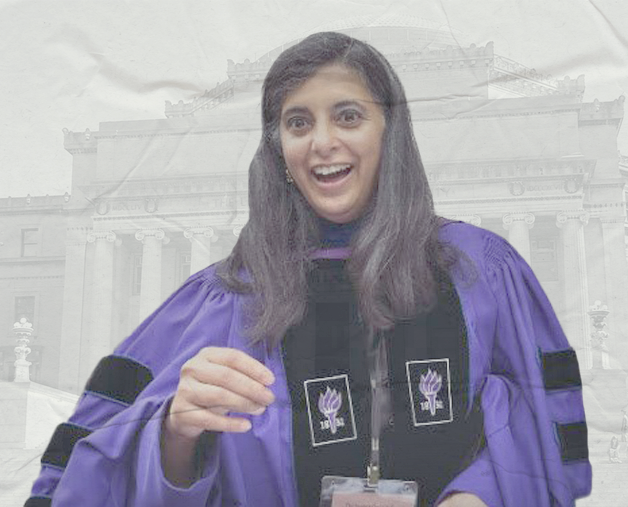
Shayoni Mitra
Assistant Professor of Theater
Support for Terrorism and Hamas Propaganda
Mitra’s activism goes far beyond political protest – it constitutes a pattern of open support for terrorism. By publicly aligning herself with Hamas, a U.S.-designated terrorist organization responsible for the massacre of Israeli civilians on October 7, she has demonstrated a complete disregard for human rights, international law, and campus safety. Rather than distancing herself from the glorification of violence, Mitra has chosen to amplify voices and movements that justify murder, rape, and hostage-taking as forms of “resistance.”Key Incidents Contributing to Extremism
Mitra’s role in promoting events that romanticize violent actors, such as Refaat Alareer—who openly praised the murder of Israeli babies—underscores her commitment to whitewashing terror. Through her rhetoric, she attempts to reframe acts of brutality as expressions of political identity, directly contributing to the normalization of violence within academic settings.- April 22, 2024 – Mitra was a participant in the “Faculty Walkout” rally in support of the students who had been arrested by the NYPD and suspended for causing property damage and disturbances on campus.
- April 30, 2024 – Mitra posted on X that she was part of the occupation of Hamilton Hall, writing, “for 22 hours we had Hind’s Hall.”
- May 16, 2024 – She took part in and helped organize the People’s Graduation for Palestine. An antisemitic event posing as a mock graduation ceremony.
- December 9, 2024 – She was one of the organizers behind Remember Refaat: Palestine & the Poetic Imagination, an event that paid tribute to Palestinian poet Refaat Alareer, who called Hamas’ October 7, mass rape and murder of innocent men, women and children as “legitimate and moral” and joked about Hamas killing babies.
Implications of Her Role as an Educator
As a professor entrusted with shaping the minds of future leaders, Mitra's conduct raises grave concerns. Her repeated endorsement of terror-affiliated movements and her refusal to acknowledge Hamas's crimes erode the academic integrity of Columbia University. By leveraging her authority to promote narratives rooted in extremism and historical revisionism, she compromises the ability of students to engage in rigorous, honest intellectual inquiry. Students under her instruction are not being challenged to think critically; they are being recruited into ideological crusades that vilify Jews, dismiss terrorism, and glorify anti-Western aggression. The result is a toxic learning environment where dissenting views are silenced, Jewish students are marginalized, and academic standards are subordinated to political fanaticism. Shayoni Mitra’s ongoing presence at Columbia is emblematic of a deeper institutional failure to confront faculty-led radicalization. Her vocal support for Hamas, participation in events that romanticize terror, and influence over impressionable students make her a direct threat to campus safety, Jewish inclusion, and the university’s moral compass. Columbia University must reckon with the fact that it has permitted an academic to operate as a political actor on behalf of violent extremists. Failure to act not only emboldens Mitra’s behavior but also signals to the broader campus community that glorifying terrorism and spreading hate are acceptable under the guise of scholarship. Assistant Professor of Theater [{"url":"https:\/\/columbia-papers.com\/wp-content\/uploads\/2025\/04\/shm-Tweets-8-1.png","alt":"Image 1"},{"url":"https:\/\/columbia-papers.com\/wp-content\/uploads\/2025\/04\/shm-Tweets-7-1.png","alt":"Image 2"},{"url":"https:\/\/columbia-papers.com\/wp-content\/uploads\/2025\/04\/shm-Tweets-6-1.png","alt":"Image 3"},{"url":"https:\/\/columbia-papers.com\/wp-content\/uploads\/2025\/04\/shm-Tweets-5-1.png","alt":"Image 4"},{"url":"https:\/\/columbia-papers.com\/wp-content\/uploads\/2025\/04\/shm-Tweets-4-1.png","alt":"Image 5"},{"url":"https:\/\/columbia-papers.com\/wp-content\/uploads\/2025\/04\/shm-Tweets-3-1.png","alt":"Image 6"},{"url":"https:\/\/columbia-papers.com\/wp-content\/uploads\/2025\/04\/shm-Tweets-2-1.png","alt":"Image 7"},{"url":"https:\/\/columbia-papers.com\/wp-content\/uploads\/2025\/04\/shm-Tweets-1-1.png","alt":"Image 8"},{"url":"https:\/\/columbia-papers.com\/wp-content\/uploads\/2025\/04\/shm-tweet-9-1.png","alt":"Image 9"}] https://columbia-papers.com/wp-content/uploads/2025/04/SHAYONI-MITRA-pic.png []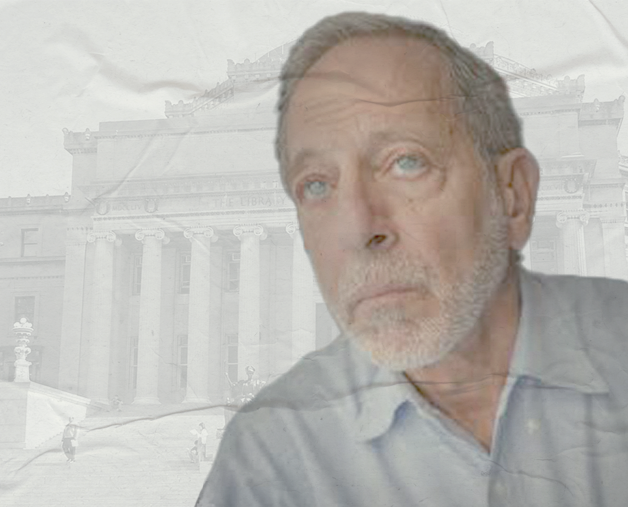
Rashid Khalidi
Edward Said Professor Emeritus of Modern Arab Studies
Defending Terrorism and Glorifying Hamas Violence
Khalidi’s recent behavior during Columbia’s 2024 pro-Hamas encampments makes clear his full embrace of violent resistance. On May 2, 2024, he addressed protestors at the encampment and encouraged them to risk “suspension, expulsion, criminal arrest”—endorsing actions that ultimately included the armed takeover of Hamilton Hall and the taking of campus workers hostage. In the same speech, he referred to Israel’s war against Hamas as “genocide carried out with American money” and accused the university administration of complicity: “Shame on the administration of this university! They will go down in infamy…” Following the October 7, 2023 Hamas terrorist attacks, Khalidi refused to condemn the massacre. Instead, in multiple interviews he implied justification: “Violence is bred by occupation. Anybody who doesn’t understand that doesn’t understand anything.” (October 18, 2023 – Amanpour & Co.) “If you can’t go to the ICC or do a BDS… then you pick up a gun…” (October 20, 2023 – El Pais) His message is clear: when peaceful avenues fail, terror is acceptable.Longstanding Ties to the PLO and Terrorist Movements
Khalidi has been repeatedly tied to the Palestine Liberation Organization (PLO)—a group responsible for decades of terrorism, including the 1972 Munich Massacre. Though he denies being a formal spokesperson, he admitted to being “deeply involved in politics in Beirut” in the 1970s. Multiple outlets, including the Los Angeles Times, New York Times, and Washington Times, have reported that Khalidi worked with the PLO, directed its press agency (WAFA), and defended terror under the guise of resistance. In a 2005 quote to The New York Times, Khalidi declared: “Under international law, resistance to occupation is legitimate.” At a 2002 speech, he explicitly drew a line between civilian targets and what he called legitimate violence: “The ones who are armed, the ones who are soldiers, the ones who are in occupation—that’s different. That’s resistance.” These statements reflect a consistent record of justifying terror against Israelis, including attacks carried out during the Second Intifada, which involved over 130 suicide bombings and the deaths of more than 1,000 Israeli civilians.Spreading Antisemitism and Demonizing Zionism
Khalidi’s antisemitic rhetoric has been central to his academic and political messaging:- He has claimed “Zionists police the American media”, echoing the dangerous conspiracy that Jews control the press.
- On December 20, 2023, he labeled Zionism a “settler-colonial project” and accused Israeli Jews of maintaining “supremacy” at the expense of Palestinians.
- In November 2023, he defended the chant “From the River to the Sea”—a slogan widely understood as a call to eliminate Israel.
- On January 17, 2017, he claimed “a group of people... in Israel and some of them in the United States... [are] going to infest our government.”
Promoting BDS and Antisemitic Campus Movements
Khalidi is a vocal supporter of the Boycott, Divestment, and Sanctions (BDS) movement. In March 2016, he signed a petition alongside 40 Columbia faculty members backing BDS and the now-banned student group Students for Justice in Palestine (SJP)—a group that publicly supported Hamas’s October 7 attacks. He has actively supported Israel Apartheid Week and organizations like Jewish Voice for Peace (JVP), aligning himself with those who seek to dismantle Israel through economic and cultural warfare. Khalidi also holds senior leadership roles in radical academic institutions, including:- Editor, Journal of Palestine Studies
- Co-Director, Columbia’s Center for Palestine Studies
- Senior Academic Advisor, Cambridge Centre for Palestine Studies
Media Gallery
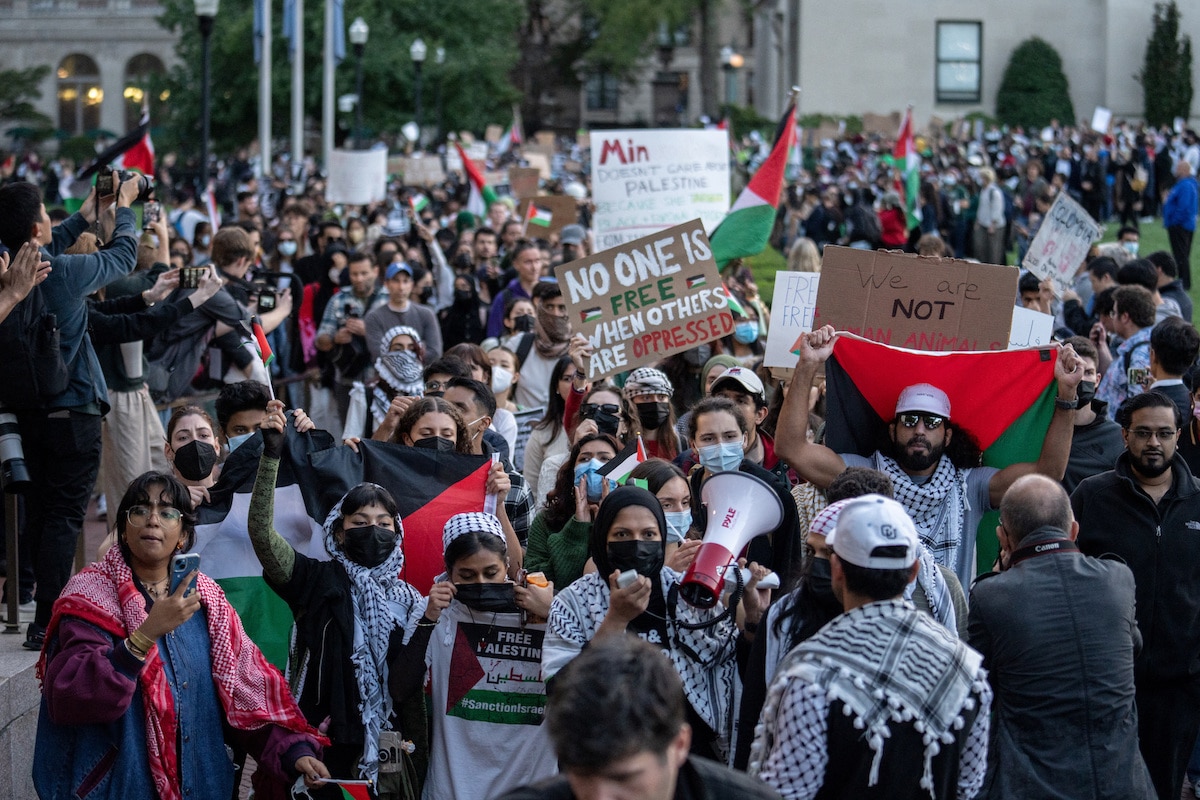
Rise of Antisemitism on Campus
Since October 7, 2023, the rise of antisemitism at Columbia has been alarming. Based on the testimonies of over 500 Jewish students, the university’s antisemitism task force reported hundreds of detailed incidents of Jewish students being spat on, shoved, pinned against walls, stalked and at times even assaulted. These disturbing incidents coincide with hate rallies where chanting for Jewish ethnic cleansing is a norm.
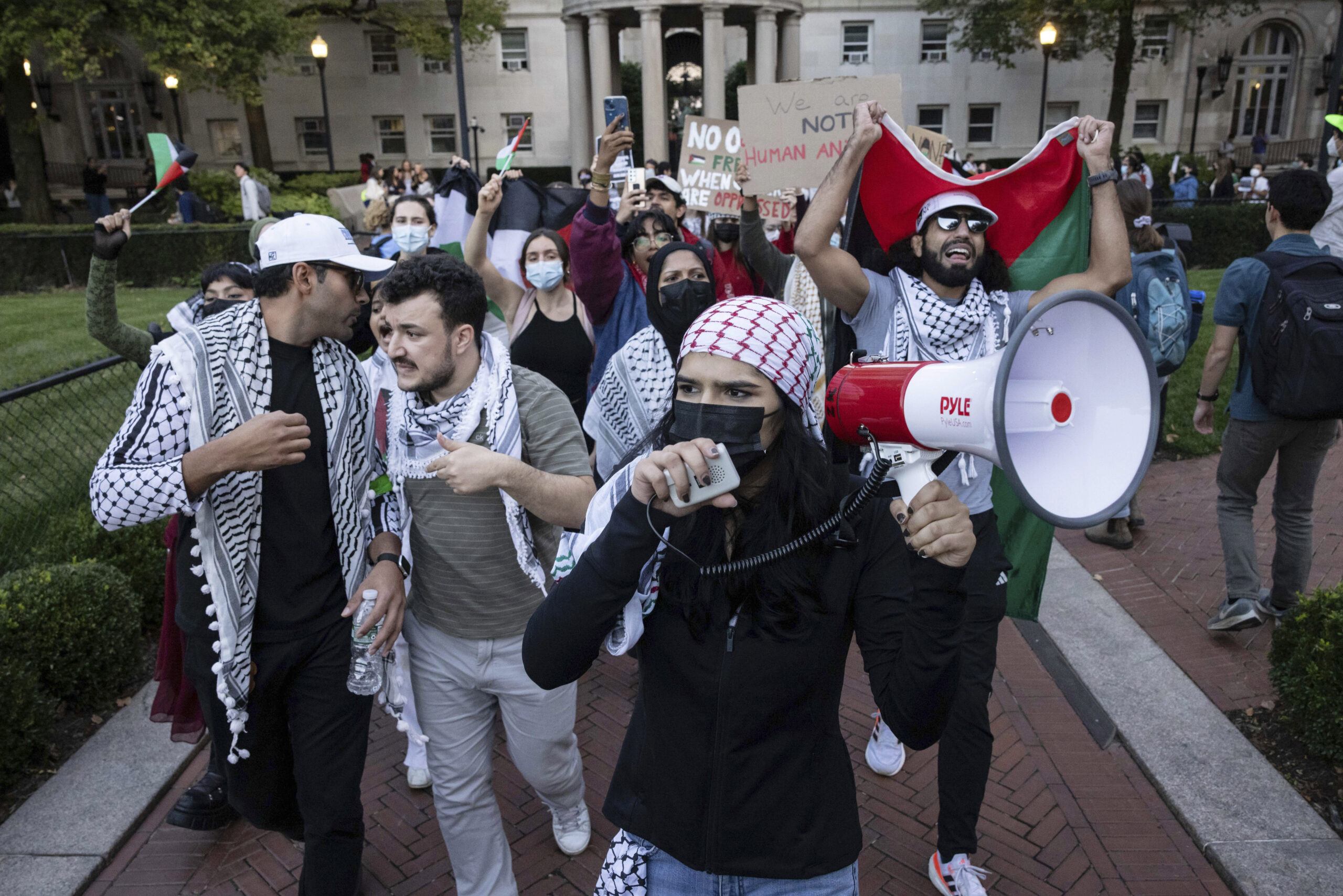
Vandalism
Antisemitic and terror worship scribbles and tags have become a common site through the halls and in the quad at Columbia. Among the more prominently featured projections of hate are swastikas, homages to Hamas and Sinwar, Intifada and other calls for the ethnic cleansing of Jews and phrases like, “Death to Zionists.”
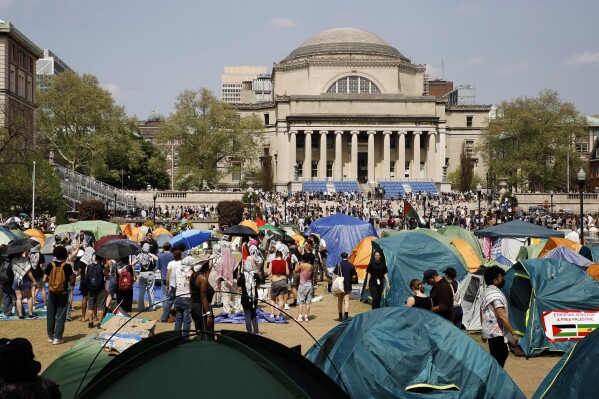
Disruption of Education
For the past two years, disruption and disorder has become common place at Columbia. From the illegal encampment that served as a hot bed for extremist rhetoric and Hamas ideology, to the occupation of Hamilton Hall in April 2024. Both extremist students and faculty members have interrupted classes to harass Jewish students and hand out Hamas propaganda and have occupied buildings in Barnard College. Not only has it created a dangerous atmosphere on campus, but it has put a vice on the education of normal students.
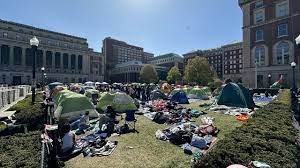
Administrative Inaction
Katrina Armstrong, the President of Columbia University, as well as other faculty members have done the bare minimum in terms of disciplinary action. Their meek approach to the extremist on campus has only fueled their destructive behavior. With every boundary broken, President Armstrong releases a statement stacked with empty promises but takes no action. She has even gone as far as to safeguard extremist students on visas, shield them from justice despite their antisemitic remarks and glorification of terror.
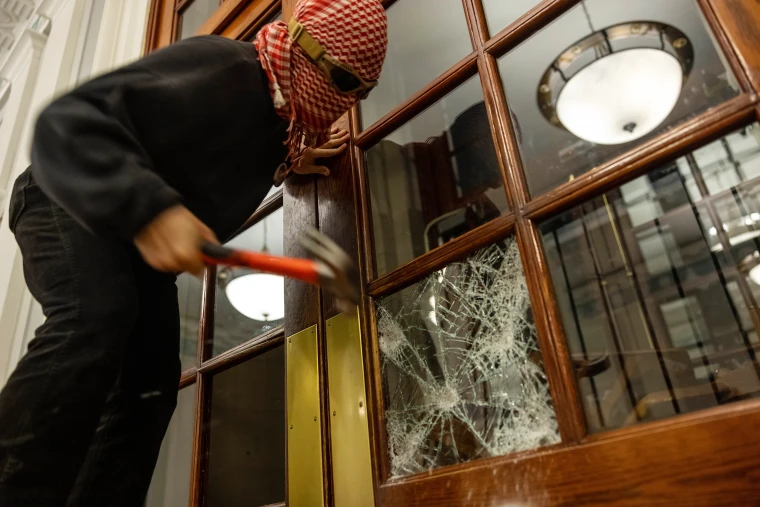
Federal Investigation and Lawsuits
A Title VI investigation by the U.S. Department of Education and a lawsuit filed by Jewish students have brought to light Columbia Universitys systemic failure to protect its community. Disturbing incidents, such as physical assaults on Jewish students, the defacement of property with swastikas, and verbal threats, underscore a longstanding issue of antisemitism that has been overlooked by university leadership. Since October 7, 2023, these challenges have intensified, with numerous reports of harassment, intimidation, and violence targeting Jewish students, further highlighting the need for immediate action and accountability.

Campus Safety
Columbia University’s tarnished reputation is now reaching beyond its donors and alumni, threatening its global standing as a premier institution. Potential international collaborations, research opportunities, and partnerships with other universities are at risk as Columbia becomes increasingly associated with intolerance and discrimination. Furthermore, ranking organizations, which are often shaped by public perception, may lower Columbia’s standing, further undermining its academic credibility and prestige.

Financial Fallout
Donor withdrawals from prominent figures such as Robert Kraft, Len Blavatnik, and Leon Cooperman, combined with the ongoing Title VI investigation by the U.S. Department of Education, threaten to significantly undermine Columbia University’s financial stability. The university has already lost $430 million in funding due to the investigation, with more potential losses looming as other donors reconsider their support. Legal costs and possible settlements related to the investigation could add millions to the university’s growing liabilities, further straining its resources and reputation.

Reputational Damage
The growing climate of hostility at Columbia University has already resulted in incidents of vandalism, harassment, and intimidation. If left unaddressed, this environment is at risk of escalating into physical violence. The unchecked spread of inflammatory rhetoric and disruptive protests has fostered an atmosphere where aggression and conflict could thrive, endangering the safety and well-being of students, faculty, and staff alike.

Academic Decline
Talented students and faculty are being driven away by the increasingly hostile environment at Columbia University, further diminishing its intellectual and cultural vibrancy. The university risks a brain drain, with the brightest minds opting for institutions that prioritize inclusivity and safety. This decline in academic and professional talent will inevitably affect the quality of education, research, and innovation at Columbia, leaving the institution struggling to regain its former prestige and standing.
Share and Spread the Word
Columbia University stands at a critical juncture. The deterioration of its campus climate is a direct consequence of systemic failures across all levels of administration. This is a call to action for all stakeholders: students, alumni, donors, and federal authorities. We must demand accountability, transparency, and decisive action to eliminate hate and restore Columbia as a beacon of safety, inclusion, and academic excellence.
If Columbia fails to act, its legacy will not be one of leadership and intellectual rigor, but of moral failure and complicity in hate.
If Columbia fails to act, its legacy will not be one of leadership and intellectual rigor, but of moral failure and complicity in hate.